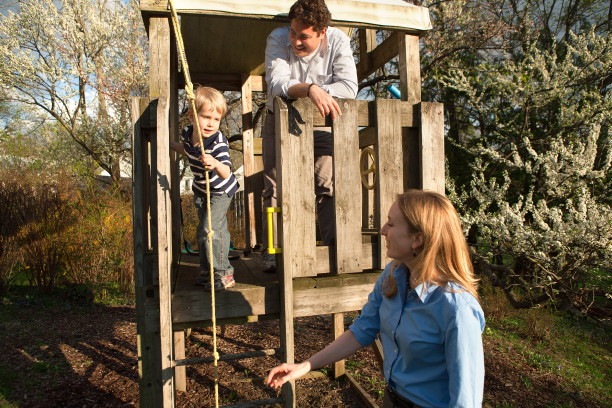COVER STORY SIDEBAR
A delicate balance: work and family

Assistant professor Cynthia Reinhart-King and associate professor Michael King (both biomedical engineering), with their son, Simon, at home in Ithaca.
On the days she picks up her son, Simon, from school, Cynthia Reinhart-King never schedules a meeting to go past 4:45 p.m. so she can leave campus by 4:55 p.m. Meanwhile, her husband, Michael King, is either making or picking up dinner. The roles are switched half the time.
Assistant professor Reinhart-King, and associate professor King, both in the Department of Biomedical Engineering, eat dinner and play with Simon until he goes to bed; after that, they can catch up on work until midnight.
Balancing work and family is hardly a new concept in academia or, indeed, in the workplace generally, but as Cornell tries to diversify its faculty, it's something officials are thinking about more and more.
Recruiting faculty in any university's engineering college two decades ago went something like this: candidates came in, and it was a safe assumption they were all white males. Sometimes they had wives, who followed their husbands.
Those days are gone. At Cornell, work-life balance and dual-career couples are concepts that simply must be part of the strategy in recruiting a younger, more diverse generation of faculty, officials say.
Reinhart-King and her husband are good examples of this strategy paying off. In 2008, Reinhart-King was hired, followed six months later by her husband.
"There were schools where it was very clear they were hiring me because of him, or him because of me," Reinhart-King says. "We never felt like that was the case here at Cornell. We all work really hard in this job, and no one wants to feel like they were hired because of who they are married to. From our perspective, Cornell did a really nice job on that. The situation for us couldn't have worked out better."
Reinhart-King says her department supports her and her husband's need to balance their lives productively, and being faculty members affords them great flexibility.
"There's no rule that says we can't work at night to catch up on what we missed during the day," she says. When, for instance, Simon is sick and needs to stay home, she and King split the day in half.
"In certain jobs or certain universities, you might be expected to be sitting in your office from nine to five," she says. "That's not my feeling here at all. I feel I'm being judged on my productivity."
Being cognizant of these types of issues will help Cornell recruit and retain more women faculty in particular, says Paulette Clancy, professor of chemical and biomolecular engineering, who herself raised a family while she was pursuing tenure two decades ago.
"A key part is aggressively helping the dual-career couples," says Clancy, who has served on many search committees. That means finding ways to creatively offer a "lifetime solution" and to highlight the benefits of living in upstate New York, she adds.